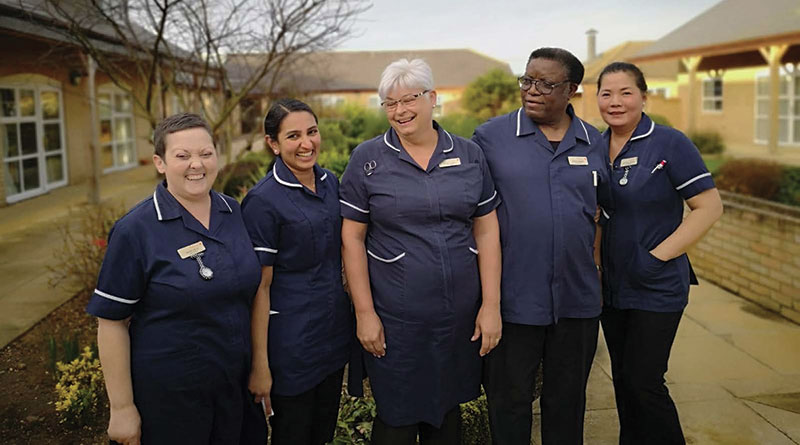Looking After Staff Wellbeing in Light of COVID-19
By Aliyyah-Begum Nasser, Director at Askham Village Community
In a care environment, you’re only as good as your staff. And at Askham we’re fortunate to have some of the best. Our staff are at the heart of our offering, so we need to ensure that we look after their health, both physically and mentally. This is a responsibility we take very seriously.
At the tail end of last year for instance, we’d initially set a strategic goal for 2020, where we would focus on looking after staff wellbeing. As part of this we’d planned several initiatives, including training mental health first aiders, bringing in on-site counsellors and using various methods to spread positivity to help show our staff just how much they’re valued and appreciated.
But while the advent of the coronavirus crisis has caused a great deal of disruption to our original plans, requiring us to focus on putting the appropriate measures in place to contain its threat, we certainly haven’t abandoned the emphasis on our staff and their health.
In fact, many of the measures we’ve brought in to counteract the virus have also assisted in improving wider staff wellbeing.
The biggest of these to date has proven to be the introduction of new digital systems, which includes an instant messaging system called Yapster and an HR tool called Alpaka.
It’s reported that up to 80 per cent of care sector staff don’t have an individual email address, something that serves to outline our industry’s somewhat outdated communication methods. It’s common within care for instance, for information to be cascaded down to staff and relayed via management, which often involves posters and flyers; a time-consuming process.
Given previous methods of communication, it’s fair to say that Yapster’s introduction has revolutionised our communication channels, having a clear benefit on staff wellbeing as a result.
The core element of this is on keeping our staff firmly in the loop. With COVID-19 requiring strict isolation procedures should anyone present symptoms, Yapster has proven invaluable in communicating with staff who are either working remotely or self-isolating at home. Through its use, we’ve been able to keep them both involved and informed, helping to safeguard their mental health by preventing them from feeling on their own or forgotten about, whilst also ensuring they don’t try and return to work too early if their physical health is at risk.
One of the real positives to emerge from the crisis is that of an enhanced sense of teamwork, with staff feeling ever more valued. Government messaging and public support has helped with this, but feeling involved internally has also been important, as has a wider sense of cooperation and collaboration across the care industry.
Another major benefit of Yapster’s introduction is that, by allowing everyone to communicate with each other, it’s helped to form an open-door policy for management, even if they’re not on site. Allowing, in turn, Askham to provide support for our staff 24/7. If staff have any issues or concerns, they’re able to reach out to management at any time and receive the appropriate guidance and help.
As well as providing much-needed ease of communication during the pandemic, Yapster has also served to weave in an element of fun and light relief amongst staff. Set against their day-to-day challenges this is hugely important. For instance, images and videos of staff and residents getting involved in the weekly clap for carers can easily be shared and circulated – as well as other positive initiatives or activities taking place in the various homes. This is working wonders in alleviating the mental burden presented by the pandemic.
The other newly introduced technology is our HR tool, Alpaka; a digital rota system. Able to be integrated with Yapster, it’s helped to provide immediate improvements to our organisation and communication.
It’s clocking in and out system in particular enables our care home managers to support staffing levels easily and clearly. This in turn minimises the stress and time consumption involved in planning rotas, helping to alleviate the mental toll on our managers who can then focus their energies elsewhere.
 Staff can also view shifts at a glance on their phones, helping with transparency. Touching once again on the need for self-isolation if presenting any symptoms of COVID-19, this has been instrumental in ensuring there are no gaps in staffing. The additional benefit of this, is that it’s prevented staff who are in work from being over-stretched, while also providing reassurance to those who are absent that they’re not placing a burden on their colleagues.
Staff can also view shifts at a glance on their phones, helping with transparency. Touching once again on the need for self-isolation if presenting any symptoms of COVID-19, this has been instrumental in ensuring there are no gaps in staffing. The additional benefit of this, is that it’s prevented staff who are in work from being over-stretched, while also providing reassurance to those who are absent that they’re not placing a burden on their colleagues.
My advice to those then who are wanting to look after mental and physical health within their care facility is to focus on communication. By keeping everyone suitably informed and abreast of developments, it helps to remove self-doubt and uncertainty. With COVID-19 creating disruption and often requiring fast-paced change, your workforce will benefit hugely from being sufficiently kept up-to-date and in the loop.
Aliyyah-Begum Nasser is a Director at Askham Village Community, a specialist rehabilitation and care community situated on the edge of Doddington, between Peterborough and Cambridge. A family-run business of over 30 years, it provides specialist care and rehab for the very young to the elderly, offering day visits, respite or long-term care, goal-focussed rehabilitation, and continuing reablement support.

